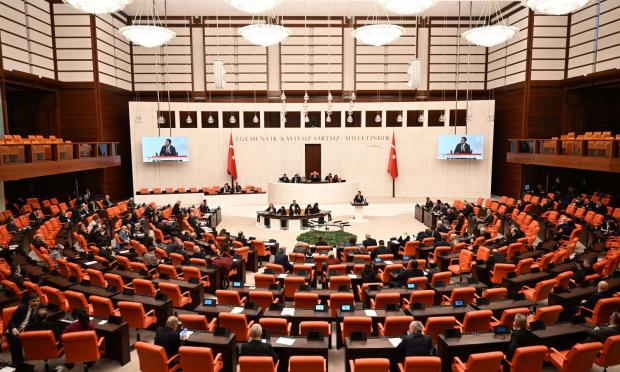Decision time has arrived for Turkey regarding the acceptance or not of Sweden's NATO membership by its Quorum, as the issue has become a "drip-drip-drip" for the Nordic country and the Alliance, due to Erdogan's oriental bargaining.
Turkish Parliament decides on Sweden's NATO membership or not
"The Turkish Parliament's General Assembly is expected to discuss Sweden's long-delayed attempt to join NATO on Tuesday," according to Turkish media which noted:
"The vote could take place as early as Tuesday, private network CNN Turk reported, while the French news agency (AFP) quoted a source as saying it could take place on Thursday.
The exact time of the vote remains unclear, with Sweden at the bottom of a list of 42 agenda items, according to the parliament's website.
The parliament's foreign affairs committee approved the protocol for Sweden's NATO membership in December, ending a 19-month-long standoff that has created tensions between Ankara and its Western allies.
The protocol must now be voted on by the 600-seat General Assembly plenary, where President Recep Tayyip Erdogan's ruling People's Alliance has a majority.
If passed by the Parliament, the President would then have to sign it into law.
Why we expect the Scandinavian country's membership in the Alliance to be approved
The Nationalist Movement Party (MHP), a partner of Erdogan's Justice and Development Party (AKP), announced on Tuesday that it would support the legislation in the parliamentary vote.
Turkey's ratification would leave Hungary as the latest country to oppose a NATO accession process launched by Sweden and its neighbour Finland in response to Russia's invasion of Ukraine nearly two years ago.
Finland became the 31st member of the U.S.-led defense alliance last April.
Its membership roughly doubled the length of NATO's border with Russia and substantially bolstered the defense of three tiny Baltic countries that joined the bloc after the collapse of the Soviet Union.
Sweden and Finland followed a policy of military neutrality during the Cold War-era conflict between Moscow and Washington.
But Russia's invasion of its western neighbor sparked Europe's largest and most brutal land battle since World War II, upending geopolitical calculations.
Erdogan's stance and blackmail over the US acquisition of F-16s
Erdogan's resistance to Sweden's NATO membership reflected his more subtle stance towards Moscow, where he has chosen to maintain close ties with Russian President Vladimir Putin as well as Ukrainian leader Volodymyr Zelensky, which has proved vital.
Turkish media reported that Putin could make his first wartime visit to Turkey next month.
Ankara has been angered mainly by the Scandinavian country's tolerance of PKK members and sympathizers. That terrorist group has led a bloody campaign against the Turkish state since the 1980s, killing more than 40,000 civilians, as well as the Gulenist terrorist group FETÖ, which orchestrated a bloody coup attempt in 2016.
Sweden tightened its anti-terrorism laws in response to Turkish pressure.
Erdogan had lifted his objections to Sweden's request at the July NATO summit in Lithuania, and has made Turkey's ratification of Sweden's request conditional on the US Congress approving "simultaneously" Ankara's request for 40 F-16 fighter jets and spare parts.
It is noted that although the US government has promised to go ahead with the sale, its approval has met resistance from Congress.
Erdogan last month discussed his demands by phone with US President Joe Biden, while Foreign Minister Hakan Fidan told US Secretary of State Antony Blinken that Turkey now expects the US government and Congress to "act in the spirit of the alliance and fulfill the commitments made regarding the F-16s.
U.S. officials have argued that Turkey's request could win the required congressional approval if Sweden's NATO membership is completed, a position Blinken reaffirmed during a visit to Istanbul this month.
"We have long felt that Sweden has fulfilled its commitment and we look forward to moving this process forward," said State Department deputy spokesman Vedad Patel
Some analysts further linked Turkey's continued delays to Erdogan's anger at Washington for its support for the way Israel continues its attacks on the Gaza Strip.
Erdogan has become one of the Muslim world's harshest critics of Israel's offensive against the Muslim world, which has killed more than 25,000 people, mostly Palestinian women and children, in response to Hamas' unprecedented attack on Israel on October 7."
There will be more to come
From the above, and given the fact that Erdogan and Bahçeli are unanimous in their support for Sweden's membership of NATO, we can conclude that their country's parliament will eventually vote in favour.
However, there are still two more steps to be taken before Sweden can formally join NATO.
One is that the Turkish President will then have to sign the relevant resolution in the country's Parliament in order for it to become law.
The second is for Hungary to lift its objections to Sweden's NATO membership.
Recall that this country is friendly and "tied" by Ertnoghann.
Our assessment is that for these two final steps to be taken, the US will have to convince Congress in favour of selling the F-16s to Turkey, a difficult task, since the Israeli lobby will now be opposed to such a prospect because of Erdogan's sharply hostile stance against Israel in the war against Hamas in Gaza.
This is where the Biden Administration's "special formula" bypassing Congress comes into play, but it is a risky action for the Democrats, especially in view of the upcoming US Presidential Elections, with Trump certainly winning the nomination as the Republican candidate after DeSantis' withdrawal from the party's electoral race.
The issue certainly has a "tail" and a long one at that, and in case of a sale of F-16s from the US to Turkey, we "see" a triangle in the Aegean Sea.



